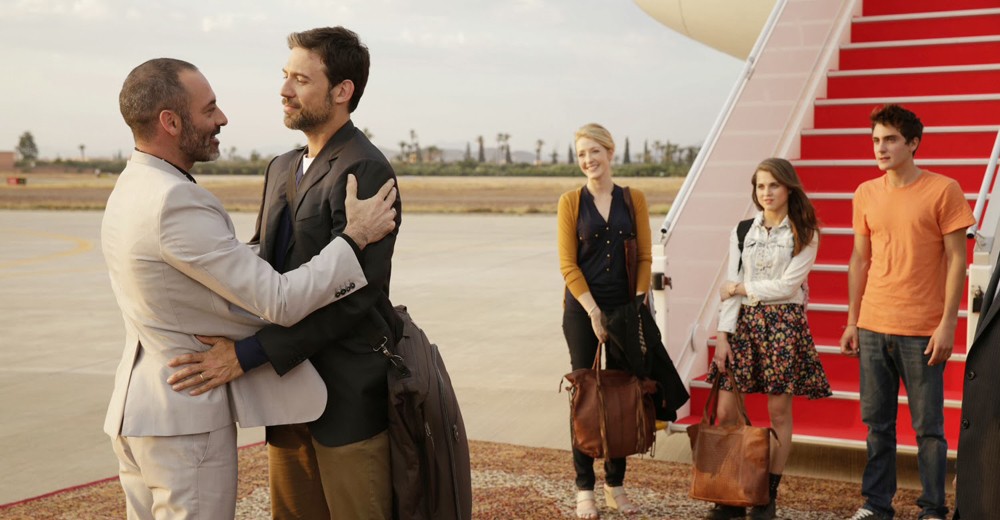
Tyrant turns out to be just another soap opera attempting to understand the crisis in the Middle East

Dear all,
With large swathes of the Arab world now turned into a bloody battleground, and with the entity calling itself the Islamic State (IS) gaining ground and support for its brutal activities, the world is still at war. But it’s a strange sort of a situation: because the longer the violence goes on, the more people seem to treat it as a part of life -- it’s almost the ‘new normal’.
Western nations express concern about the conflict, they hold conferences, announce policies and condemn the videos showing the beheading of kidnapped locals or foreign journalists or aid workers. Yet there seems to be little urgency in sorting out the situation.
There appears to be a horrible callousness in this approach: almost as if it’s okay for the fighting in the Middle East to continue, almost as if it suits the west well if IS continues its extremist activities.
Just over a decade ago Iraq, Syria and Libya were functioning countries. Run by cruel tyrants perhaps but rich countries with quality systems of health and education. Their citizens mostly had a good standard of living, except of course for the brutal political repression and the general fear of the security services. Iraq’s tyrant Saddam Hussein was removed by US-led forces in 2003 under the mantra that he was an evil repressive dictator and a danger to the world. No matter that, until then, the US had been happy to support him.
Well, post-Saddam Iraq has hardly been a happy place: elections and parliament notwithstanding, the country has basically been in a state of civil war for a decade, a civil war made all the more vicious by the sectarian element underlying it. The story of Libya and Syria is not too different. The basic question being: are they in a better or worse situation than before the US decided to intervene and move against the tyrants?
In the wake of the so-called Arab Spring and the Iraq war, a number of films and dramatisations have been made about events in the region. One of my favourites is The Green Zone, not just because it has the lovely Matt Damon in it but also because it is thought-provoking in the way it exposes the political duplicity and devious financial interests linked to the conflict. You could sort of understand the politics of the film in the way that you cannot of the recent 10-part TV drama Tyrant.
Tyrant seemed to promise a great deal as it came from the makers of Homeland (Gideon Raff, Howard Gordon), but alas it delivered pretty much nothing. The central character of this Fox TV drama is Barry, a successful California paediatrician whose life is changed when he decides to go back to his home country for his nephew’s wedding.
Barry is actually Bassam, the son of Khaled Al Fayeed, the dictator ruling an oil-rich Middle Eastern country called Abuddin. Khaled is a sort of Hafez al Assad/Saddam Hussein type of character who has groomed his eldest son (Jamal) to be his successor. Unfortunately Jamal is an unpleasant psychopathic character, sort of like Saddam’s son Uday. Barry is sort of like Bashar al Assad, a quiet competent doctor with a life in the west, who eventually feels his country needs him. Their mother is a British woman, sort of like Hosni Mubarak’s wife or the Jordanian King Abdullah’s mother.
Barry gets sucked into the politics of Abuddin and tries to get his brother to move towards more democracy and better governance, till at last he decides more drastic action is needed. He gets the American State Department and the CIA onside only to be told later that the Americans don’t want to get things messy by encouraging this Democracy business and that they prefer the status quo i.e. the evil tyrant Jamal.
I heard one radio reviewer describing Tyrant as a show that is "like a version of Dallas set in the Middle East". That is sort of accurate (in that is an intrigue filled family drama) except it is more violent and more ‘foreign’. But eventually the most disappointing thing about Tyrant is that it seems to have no moral compass and no dramatic focus either. It had a lot of interesting elements and some great cameos but didn’t really inform about the complexities of the political and strategic situation. You could argue that neither does Homeland but for some reason that show (despite the hilarious ‘Pakistani’ locales and accents) is still compelling viewing.
Tyrant turned out to be just a soap opera unfolding in exotic palatial settings -- with sex, violence, murder, sibling rivalry, identity and oppressive families thrown in for good measure. To sum up, it is trashy and slightly pointless despite some good performances and some interesting situations.
Best Wishes,